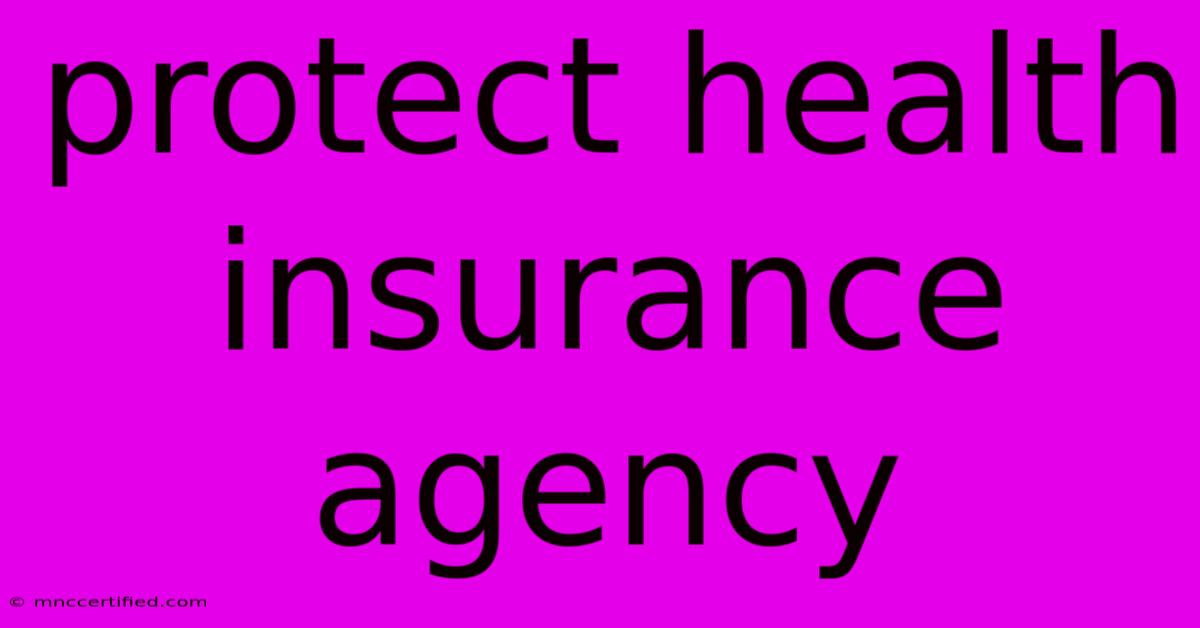Protect Health Insurance Agency

Table of Contents
Protecting Your Health Insurance Agency: A Comprehensive Guide to Risk Management
The health insurance industry is complex and constantly evolving, presenting unique challenges for agencies. Protecting your health insurance agency isn't just about safeguarding finances; it's about ensuring the continued success and reputation of your business, and ultimately, protecting your clients. This comprehensive guide will explore various strategies for mitigating risks and building a robust security framework.
Understanding the Key Risks Facing Health Insurance Agencies
Before implementing protective measures, it's crucial to identify the potential threats. These risks can be broadly categorized into:
1. Cybersecurity Risks:
-
Data breaches: The sensitive nature of health information (PHI) makes your agency a prime target for cyberattacks. A breach can lead to hefty fines under HIPAA, reputational damage, and loss of client trust. Investing in robust cybersecurity measures is paramount. This includes strong firewalls, intrusion detection systems, employee training on phishing and malware, and regular security audits.
-
Ransomware attacks: These attacks can cripple operations and demand significant ransoms for data recovery. Regular backups and a disaster recovery plan are essential to minimize downtime and data loss.
-
Phishing scams: Employees can inadvertently fall victim to phishing emails, leading to malware infections or unauthorized access to sensitive data. Employee training on identifying and avoiding phishing attempts is crucial.
2. Compliance and Legal Risks:
-
HIPAA violations: Failure to comply with the Health Insurance Portability and Accountability Act (HIPAA) can result in severe penalties. Staying up-to-date on HIPAA regulations and implementing strict compliance protocols is non-negotiable. This includes proper data encryption, access control, and employee training.
-
Licensing and regulatory changes: The health insurance industry is heavily regulated. Staying informed about changes in licensing requirements and regulatory updates is crucial to avoid legal issues. Consider engaging legal counsel specializing in health insurance to ensure compliance.
-
Errors and omissions: Mistakes in policy selection, enrollment, or claims processing can lead to legal action. Implementing robust quality control measures and thorough training for your staff are essential.
3. Operational Risks:
-
Reputational damage: Negative reviews, client complaints, or even perceived negligence can severely impact your agency's reputation. Proactive customer service, transparent communication, and addressing complaints promptly are key.
-
Employee theft or fraud: Internal threats pose a significant risk. Implementing strong internal controls, background checks, and regular audits can help mitigate this risk.
-
Business interruption: Natural disasters, power outages, or other unforeseen events can disrupt operations. A comprehensive business continuity plan, including backup systems and offsite data storage, is vital.
Implementing Protective Measures: A Practical Approach
Protecting your health insurance agency requires a multi-faceted approach:
1. Strengthen Your Cybersecurity Posture:
- Invest in robust cybersecurity software: This includes firewalls, antivirus software, intrusion detection systems, and data loss prevention (DLP) tools.
- Implement multi-factor authentication (MFA): MFA adds an extra layer of security, making it harder for unauthorized users to access your systems.
- Regularly update software and systems: Keep all software and operating systems up-to-date with the latest security patches.
- Conduct regular security audits and penetration testing: Identify vulnerabilities and address them proactively.
- Educate your employees: Regular training on cybersecurity best practices is crucial.
2. Ensure HIPAA Compliance:
- Develop a comprehensive HIPAA compliance plan: This should detail your agency's policies and procedures for protecting PHI.
- Implement strong access controls: Restrict access to PHI based on the need-to-know principle.
- Encrypt all sensitive data: Encryption protects data even if it's stolen.
- Regularly train your employees on HIPAA regulations: Ensure everyone understands their responsibilities.
3. Build a Strong Operational Framework:
- Develop a business continuity and disaster recovery plan: Outline procedures for handling various disruptive events.
- Implement robust quality control measures: Ensure accuracy in all processes.
- Invest in employee training: Well-trained employees are less likely to make mistakes.
- Establish a strong customer service policy: Address client concerns promptly and professionally.
4. Leverage Insurance and Legal Counsel:
- Cybersecurity insurance: This can help cover the costs associated with a data breach.
- Errors and omissions insurance: This protects against claims resulting from professional negligence.
- Legal counsel specializing in health insurance: They can help you navigate complex regulations and ensure compliance.
By implementing these strategies, you can significantly reduce the risks facing your health insurance agency, protecting your business, your clients, and your reputation. Remember, proactive risk management is an ongoing process requiring continuous vigilance and adaptation to the ever-changing landscape of the health insurance industry.

Thank you for visiting our website wich cover about Protect Health Insurance Agency. We hope the information provided has been useful to you. Feel free to contact us if you have any questions or need further assistance. See you next time and dont miss to bookmark.
Featured Posts
-
Rutgers Football Loses Close Game
Nov 24, 2024
-
Tottenham Thrash Man City 4 0
Nov 24, 2024
-
Messi Faces Real Madrid In December
Nov 24, 2024
-
Leicester Ratings Chelsea Defeat
Nov 24, 2024
-
Georgia Vs U Mass Prediction And Analysis
Nov 24, 2024